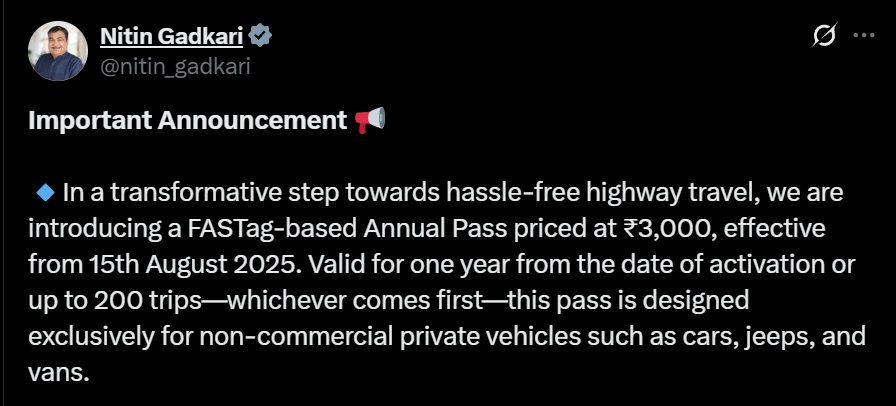_1750421705.webp)
Table of Content
▼The Indian government is poised to bring major changes to road travel again. Starting August 15, 2025, private vehicle owners will be able to get a new annual pass for existing FASTag system — for just ₹3,000. Unveiled by Union Minister for Road Transport and Highways, Nitin Gadkari, the proposal aims to make toll payments universal and reduce congestion on India’s expanding National Highway system.
Let’s dive into what this FASTag-based annual pass means for daily commuters and long-distance drivers.
A Simplified Toll Solution: What the New Annual Pass Offers

In a move to enhance convenience for non-commercial private vehicle owners — including cars under 10 lakh, jeeps, and vans — the new annual pass will enable seamless, pre-paid toll access across national highways.
Key Highlights:
- Annual Price: ₹3,000
- Eligibility: Private vehicles (cars, jeeps, vans) only
- Validity: One year from activation OR 200 highway trips (whichever comes first)
- Activation Date: From August 15, 2025
Why This Move Matters
Currently, toll plazas often become hotspots for bottlenecks, disputes over charges, and inconsistent payment methods. This FASTag-based new annual pass aims to fix those problems by offering:
- Uniform Toll Payments: One fixed fee, nationwide access
- Faster Travel: Reduced waiting time at toll plazas
- Better Compliance: Resolves issues of toll plazas being closer than the mandated 60 km distance
- Cost-Efficiency: Especially beneficial for frequent highway users
According to Gadkari, “This pass will deliver seamless and cost-effective travel across national highways and respond to long-standing concerns over toll plaza proximity.”
Where to Get It: Simple Digital Activation
The Ministry is making it easy for users to activate and manage the new pass digitally.
Activation Platforms:
- Rajmarg Yatra Mobile App
- Official Websites:
- NHAI
- MoRTH
A dedicated link for activation will be provided on these platforms shortly before the official rollout date.
Addressing Toll Plaza Concerns: 60 km Gap Guideline
The move comes amid growing public dissatisfaction about toll plazas located too close to one another. Current policy mandates a minimum distance of 60 km between toll booths. However, several violations have led to user complaints and calls for reform.
Gadkari clarified that the new annual pass is a strategic response to these concerns. By offering a prepaid, fixed-price option, the government expects to minimize such grievances and improve trust in the tolling system.
Who Benefits the Most?
This initiative will be a game-changer for daily commuters, long-distance drivers, and even those driving budget-friendly vehicles like best hatchback cars or cars under 10 lakh. These users, who often rely on highways for work and leisure travel, will now find journeys more predictable and affordable.
Advantages for Private Vehicle Owners:
- No need to worry about per-trip toll deductions
- Better fuel efficiency due to reduced idling at toll booths
- Greater cost savings for frequent travelers
- Ease of managing toll payments digitally
What’s Next?
With only weeks to go before the launch, the focus is now on awareness and outreach. The government is expected to roll out informative campaigns and ensure a glitch-free digital onboarding experience.
While this new annual pass won't apply to commercial or heavy-duty vehicles, it lays the groundwork for expanding simplified tolling solutions in the future.
Conclusion
India's infrastructure is evolving rapidly and digital-first strategies like FASTag-based new annual pass are helping keep up. At ₹3,000 for a year's worth of access, this is a financial relief that gives you the promise of more predictable, smoother, and faster journeys.
If you are someone who habitually travels India's national highways, you will find that the annual pass will pay for itself rapidly — saving you time and money. With just one prepaid transaction for one year's worth (or 200 trips) of highway convenience, it's a whole new way of hitting the road in India.
Also Read: Maruti Suzuki Opens India’s Largest In-Plant Railway Siding at Manesar
Neha Mehlawat
Neha Mehlawat is an automotive journalist and industry analyst with 10+ years of experience covering cars, bikes, and mobility trends. She tracks the latest launches, technology upgrades, and policy changes in the auto sector, delivering sharp insights that help readers stay ahead in the fast-evolving world of automobiles.
_1771924453.webp)
_1771917963.webp)
_1771914517.webp)


